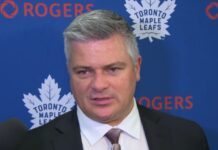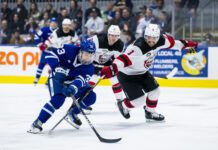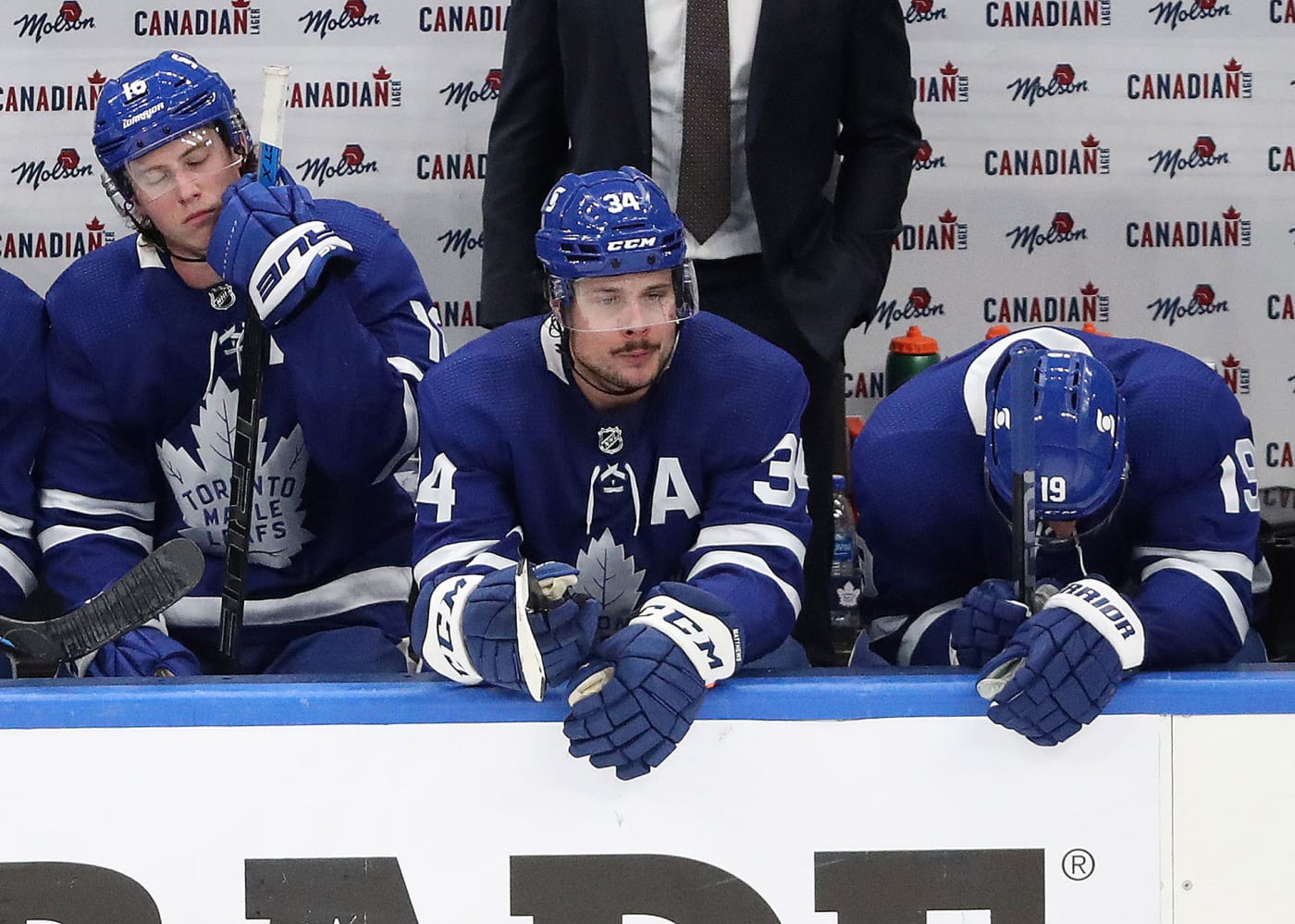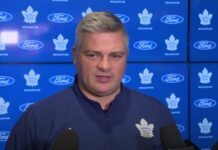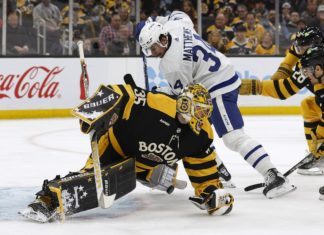It is going to be a really quiet weekend on the draft-selection front for the Maple Leafs, who have never had so few picks (three) since the advent of the entry draft.
That could change to some degree between today and tomorrow, but typically, you’re hoping to be twiddling your thumbs at the draft table because you’re coming off of a deep run in the playoffs, not after this season’s outcome. That said, Kyle Dubas’ point yesterday about the team making 12 selections last October — when the team had more complete information and viewings on draft prospects — shouldn’t be lost on anyone.
Onto a few quick hits.
Kyle Dubas’ media rounds
A few quick takeaways from Kyle Dubas’ press junket yesterday.
I wasn’t surprised to hear the continued faith expressed in the core of this team. I was actually kind of impressed that Dubas could maintain a straight face as he rattled off the long list of examples of the times his team has failed to get the job done in a series-deciding game while framing all of them as learning moments.
Dubas essentially said, to paraphrase:
We need to learn how to be less passive in series-deciding games. We didn’t get the job done in Game 5, Game 6, or Game 7 this year versus Montreal, or in Game 5 versus Columbus last year, or in Game 7 against Boston in 2019, or in Game 6 against Boston in that same year, or against Boston again the year before that…
Dubas’ bet that his $10+ million stars will be better next Spring — i.e. produce more than a goal between them — than Matthews and Marner were versus Montreal is a sensible one. Where Dubas faces his biggest question mark: With his roster construction, has he left himself enough of a margin for error in order to win not just a round but four of them in the playoffs?
The Leafs haven’t played more than seven games in a playoff run in the five consecutive years of making the postseason during the current era. In that time, we have seen John Tavares injured for an entire playoff round, Nazem Kadri suspended for the majority of two of them, Jake Muzzin miss multiple series finales (for the record, he has missed time in three of his last four playoff rounds, including appearing in just two games for LA in 2018), Mitch Marner fail to score in two full series, Nick Foligno go down hurt, and Andreas Johnsson miss most of a series, among other key underperformances and injury adversities (I’ll even throw in Roman Polak breaking his leg versus Washington in 2017 at a time when he was playing very well, necessitating the insertion of Martin Marincin into the lineup, who lost the battle in front of the net in the series-deciding Game 6 OT).
Shit always happens amid the chaos and long grind of an NHL postseason. How does Dubas equip his roster to better handle these eventualities? To what degree can the growth come internally — i.e. Marner and Matthews handling adversity better — and where do Dubas and Keefe need to better support them?
Tampa Bay won a Cup without Stamkos for an entire run in 2020, and while they were relatively healthy this year, they were missing Alex Killorn, Barclay Goodrow, and David Savard for a handful of games each, and Nikita Kucherov played at much less than 100% due to broken ribs. The Islanders took the Lightning to Game 7 of the Cup semifinals without their captain for the entirety of the playoffs.
This was a trait Dubas remarked on as well when asked about the final four teams in the playoffs: “I don’t know if you saw Julien [BriseBois]’s press conference at the end as well where he talked about the sacrifices that the players of Tampa Bay had made. I thought that was pretty bang on as well… There is a reason they have won back-to-back Stanley Cups.”
Dubas also freely admitted that the team’s approach to cap allocation has never been done in history, that they never wanted to do it this way (i.e., the flat cap ruined best-laid plans), and that he is still willing to “bet everything” on this working out (it actually makes sense to me for him to double down at this stage). Dubas also mentioned that — and I assume he was referring to the forward depth here— the team needs to be better in the “depth areas,” admitting, “that’s on me.”
2021-22 may well represent the last opportunity for Dubas to find the right mix, and for the Big 4 to finally reward their GM’s abiding faith at playoff time.
The Leafs’ elephant in the room this offseason
After hearing Dubas speak about the team’s needs the other day, the odds are that we will see the Leafs carry out some version of the following series of moves this offseason:
- Via FA or trade, add top-nine LW help (names like Saad, Schwartz, Foegele, Bertuzzi).
- Add an additional cheap depth forward (or two), ideally at least one who can help on the penalty kill (a McGinn / Martinook / Khaira type), and ideally one who can play center. Alex Galchenyuk doesn’t match either description, but he might also be in this mix.
- If Zach Bogosian opts for a southern market instead of a return to Toronto, add a cheap veteran D with some bite who can take a regular shift but may well be a #7 on many nights if Liljegren and Sandin prove to be ready.
- Add a 1B goalie.
With the Big 4 off-limits, the only potential for major fireworks really comes down to the Morgan Rielly trade-or-sign decision. A more dramatic reshaping of the Leafs roster this offseason has one clear avenue, and that’s through a move like this.
The possibility of landing the right impact forward to change the mix up front in return for Rielly and then turning around and adding a defense piece (ideally on the right — although we’re not likely to be talking Dougie Hamilton territory here, and the FA crop is pretty thin) would constitute a real shakeup, and it avoids the growing possibility of Morgan Rielly following Zach Hyman out the door in a year’s time.
The value Seth Jones and the 32nd overall pick fetched day — Adam Boqvist, the 12th overall pick, an additional first-round pick, and a second-round pick — as well as Rasmus Ristolainen — a first-round pick, a second, and Robert Hagg — had to raise some eyebrows in the Leafs’ front office, albeit the returns were heavy on futures, unlike the hockey trade the Leafs would be seeking out for Rielly.
Because of the difficulty of finding the right one of those, I don’t necessarily expect it, but it would’ve been nice to hear someone ask Dubas about the plan here in the media rounds yesterday. This is the big elephant in the room this offseason entering Rielly’s walk year.
Dubas demanding a second-round pick in a Hyman sign-and-trade
According to Elliotte Friedman, the Maple Leafs have been offered a sixth-round pick by Ken Holland in order to facilitate a sign-and-trade for Zach Hyman in Edmonton. Kyle Dubas has countered with an asking price of a second-round pick.
Toronto and Edmonton will work on compensation agreement for Hyman. I don’t believe the Oilers are interested in giving up more than a late round draft pick. Oilers seem fine with a 7 or 8 year agreement.
— Darren Dreger (@DarrenDreger) July 23, 2021
Toronto and Edmonton will work on compensation agreement for Hyman. I don’t believe the Leafs are interested in getting a late round draft pick. Leafs seem fine if Oilers sign a 7 or 8 year agreement.
— Kevin Papetti (@KPapetti) July 23, 2021
It’s certainly tempting to collect something instead of nothing before Hyman walks out the door, especially in a draft where the team owns three picks. Knowing Hyman appears to have agreed to the framework of a seven-year deal in Edmonton once the UFA period opens, Dubas doesn’t exactly have much leverage here.
There is a logic for why Dubas is wise to stick to his guns on demanding a reasonable draft pick in return, though. This hasn’t happened before — a sign and trade facilitating a max eight-year contractual term — and the cap savings the Leafs will be affording the Oilers for the next seven seasons could amount to around ~$500,000 a year based on how much the eight-year term could shave off of Hyman’s average annual contract value.
If the same scenario were to play out next year with Morgan Rielly — just as an example — it would mean the Leafs have a tough case in asking for much more. Granted, under this hypothetical, Rielly’s AAV would be higher and the savings potentially more significant over the eight years than is the case with Hyman’s deal. Theoretically, though, the additional ~500k cap flexibility for seven years on Hyman (~$3.5 million in total savings for the next seven years) should be worth more than a sixth-round pick, and it might be worthwhile for Dubas to hold firm and walk away if Ken Holland doesn’t bump up the draft-pick value in return for a signed Hyman.
You could fairly argue that taking a sixth-rounder and allowing the Oilers to sign the eighth year at $5+ million hamstrings Edmonton with a bad contract that lasts even later into Hyman’s 30s, but it’s not so much about caring what specifically becomes of Edmonton during the Hyman era as it is about the precedent and the objective value of the cap savings the Leafs are facilitating for another team.


